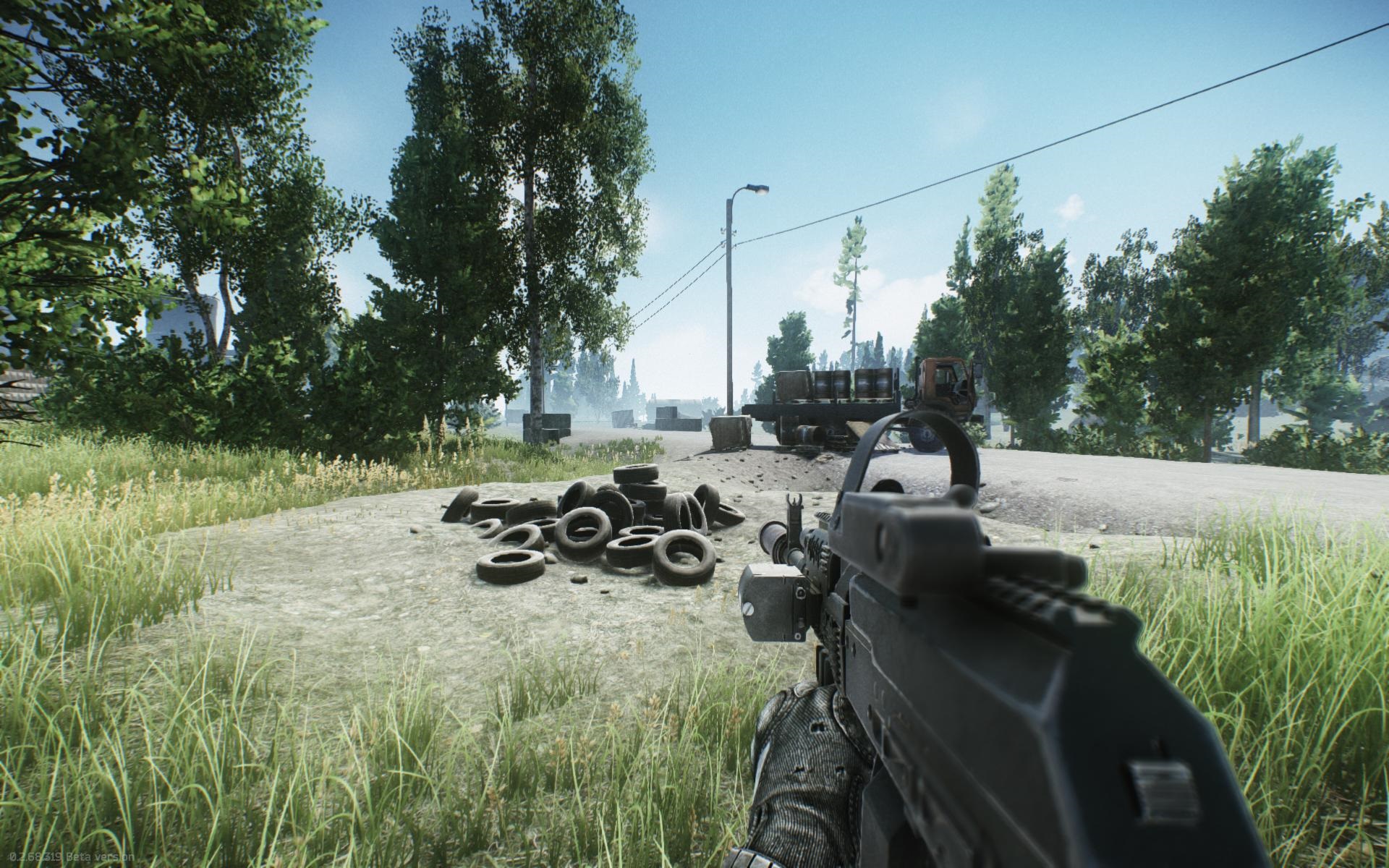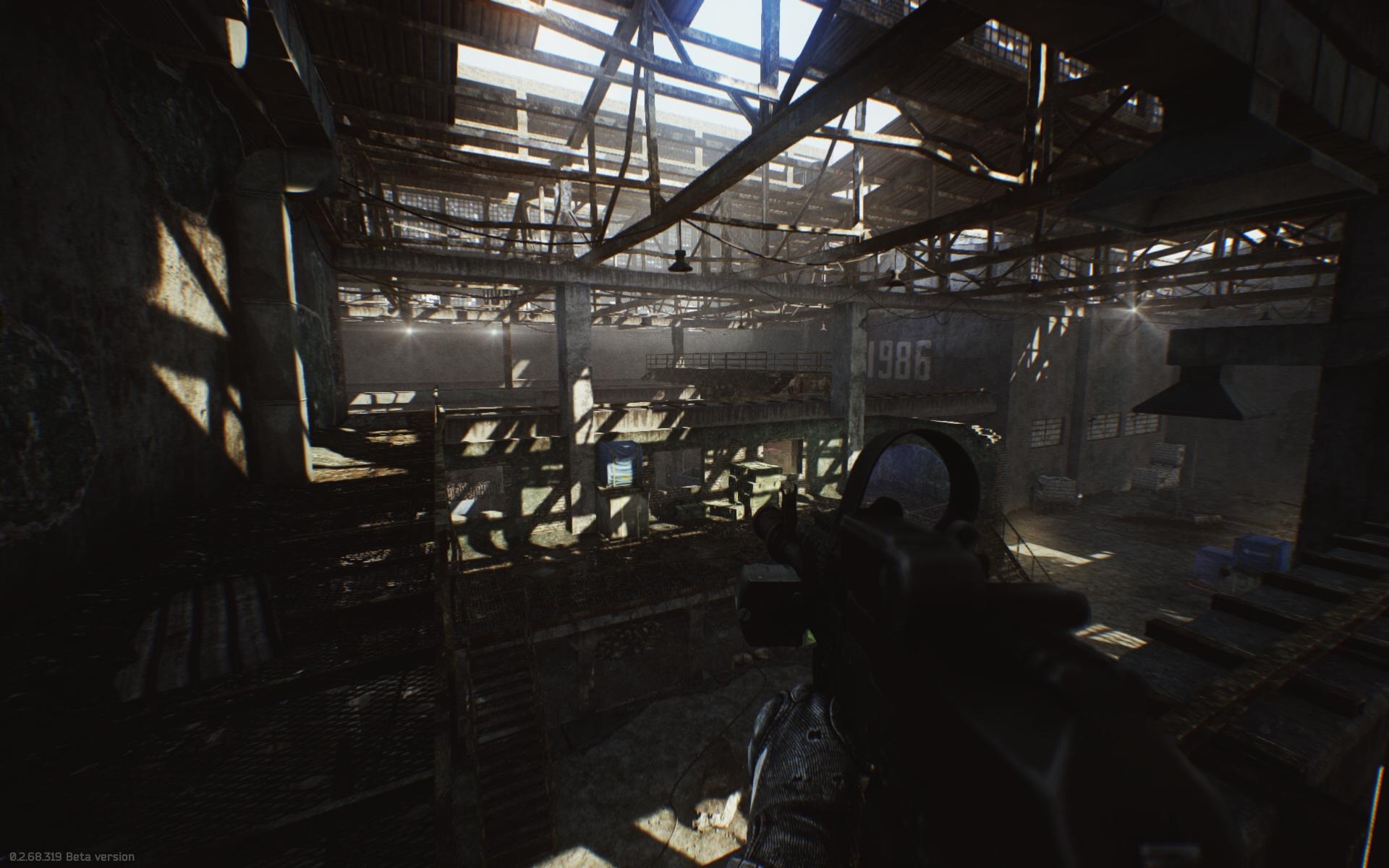Escape from Tarkov is a compelling game about gear, and how we store it
A simple thing like a gridded inventory can determine a lot about how a game plays.

Escape from Tarkov obsessed my finger with the 'R' key. In the moment-by-moment tension of stealthily exploring the ruined sprawl of Tarkov, the key kept my ammo topped off with a military-precise reload animation. In the moment-by-moment tension of my stash’s inventory screen, it rotated a selected piece of gear to fit either horizontally or vertically into a 10x60 grid. Both actions can be equally thrilling—one as a hinge for staying alive, and the other for that certain shiver when Lego pieces snap cleanly together.
Tarkov is weird like that. It dances around clear comparisons. On the surface, its gorgeously expansive wilds, limited resources, and lone-wolf theme imply yet another battle royale-style game lusting after the spotlight of genre darling PlayerUnknown’s Battlegrounds. After spending a week in the closed beta, I’m convinced there are more parallels to The Division’s Dark Zone than anything else. Tarkov brandishes a hefty gear grind alongside the need to extract safely from an area to keep everything you found. Its astrological sign is a shopping cart. Tarkov is DayZ 2: The Quest for More Stuff.
I’ve spent more time staring at my stash menu than actually in the field.
I’ve spent more time staring at my stash menu than actually in the field. As both a character sheet and a pre-deployment step, the stash is the clearest example of Tarkov's gear-centered approach. You can't lose anything safely stored in your stash, driving a sense of permanency to a growing collection of weapons, attachments, money, medical supplies, bags, armor, and anything else deemed worthy of keeping.
An item can tell a story of triumph or despair by virtue of its presence. I have a scoped SKS carbine that causes flashbacks to a sniper battle against a rooftop marksman during a nighttime thunderstorm. My medical kit was salvaged in the midst of a savage factory raid, my shotgun’s sights nervously centered on the extraction hallway door as I watched the seconds to exit ticking down. In PUBG, interactions with the inventory involve jab-like mouse flicks to minimize time spent out of the action. In Tarkov, dragging and dropping is slow, methodical—a ceremonial sign of respect to past efforts.
A day in the life
As an example of what it's like, here's a moment from my recent Tarkov exploits—or, more accurately, fumbles.
I’m staring at dirt. It’s a clear, sunny day on this grassy patch of nature beside a ruler-straight factory road. A bird chirps somewhere overhead. In a fit of sacrilege against the survival gamer’s rulebook, I’ve tossed my rifle, spare magazine, body armor, and pistol somewhere in the brush. I’m armed like a freshly spawned player with a hatchet and a set of simple clothes, the colloquial 'hatchling' as branded by my fellow wasteland wanderers. I’ve shed my material possessions for a specific reason, but that didn’t include losing track of my hoard. I've forgotten where I put everything.
The reason I dropped everything? It affords me additional inventory space to fill up on flotsam scrounged from the shuttered homes and piles of debris peppering the strip of shoreline I’m visiting. My backpack, vest, and pockets brim with cigarette packs, circuit boards, handfuls of bullets, and other assorted junk. I even managed to score a pump-action shotgun from the corpse of a nearby Scav—the roaming, balaclava’d bandits hoping for a quick kill—which will net a tidy profit with my black market contacts.
Keep up to date with the most important stories and the best deals, as picked by the PC Gamer team.
I’m not too worried about my actual gear. It’s insured: at the cost of a few thousand roubles per piece of equipment, I can get my stuff restored to me within 24 hours of losing it. Such a handy service forms the crux of my strategy to maximize as much carrying room as possible to gorge my post-mission stash; deploy with insurance, toss my stuff, and extract with loot.
I hear the metallic clacks of a curved AK magazine being inserted into a receiver behind me. Things never go as planned. In the span of a single, sharp crack, I cleverly solve the mystery of the location of my missing treasure pile. Overriding the embarrassment of being shot with my own gun is a lingering epiphany: I suck at hiding things.

War of the zippers
There’s a whole meta-game to eking out as much empty stash space as possible in order to stock up on more items.
It’s surprising how something so seemingly innocuous as gridded inventory management can shape Tarkov’s character so strongly. There’s a whole meta-game to eking out as much empty stash space as possible in order to stock up on more items. Playing Tetris with your stuff isn’t as visually appealing as admiring the occluded sunlight glinting off an AK’s frame, but it’s a necessary linchpin. I enjoyed picking up small tricks such as nesting backpacks (which can store smaller items themselves) within each other to clear chunks of space. I spent an evening sorting my stacks into needed and unneeded sections, feeding the latter to the ever-hungry trade merchants tempting my roubles with stock galore, and I signed off with the same fulfilled feeling as hunting Scavs in an apartment block. Apart from DayZ, I’m unsure if any other FPS I’ve played has capitalized on the deep-seated psychology of hunter-gather impulses as strongly as Tarkov has.

My lingering concern for Tarkov’s staying power rests with the fragility of its gameplay loop: roam, gather, trade, equip, repeat. So much of its experience hinges upon gathering gear that there must be an inevitable point where no more upgrades are needed, dimming the call for exploration. In Tarkov’s current state, players grab gear simply to upgrade numbers on a stat bar. There's an absence of more complex incentives—surmounting a difficult challenge or progressing a narrative, for example. The worst outcome is a world filled with bored, kitted operators assassinating hapless hatchlings and each other simply because they're too geared, a pitfall frequently observed in the server-hopping kill squads of DayZ. Developer Battlestate Games seems aware of this risk, promising additional info and a priority on tying gameplay to a lengthy storyline and quest-style missions. I'm hopeful for something that'll draw me further into Tarkov’s shattered beauty. For now, gear is king in Escape from Tarkov, and I need to find better hoarding spots.
Omri Petitte is a former PC Gamer associate editor and long-time freelance writer covering news and reviews. If you spot his name, it probably means you're reading about some kind of first-person shooter. Why yes, he would like to talk to you about Battlefield. Do you have a few days?


